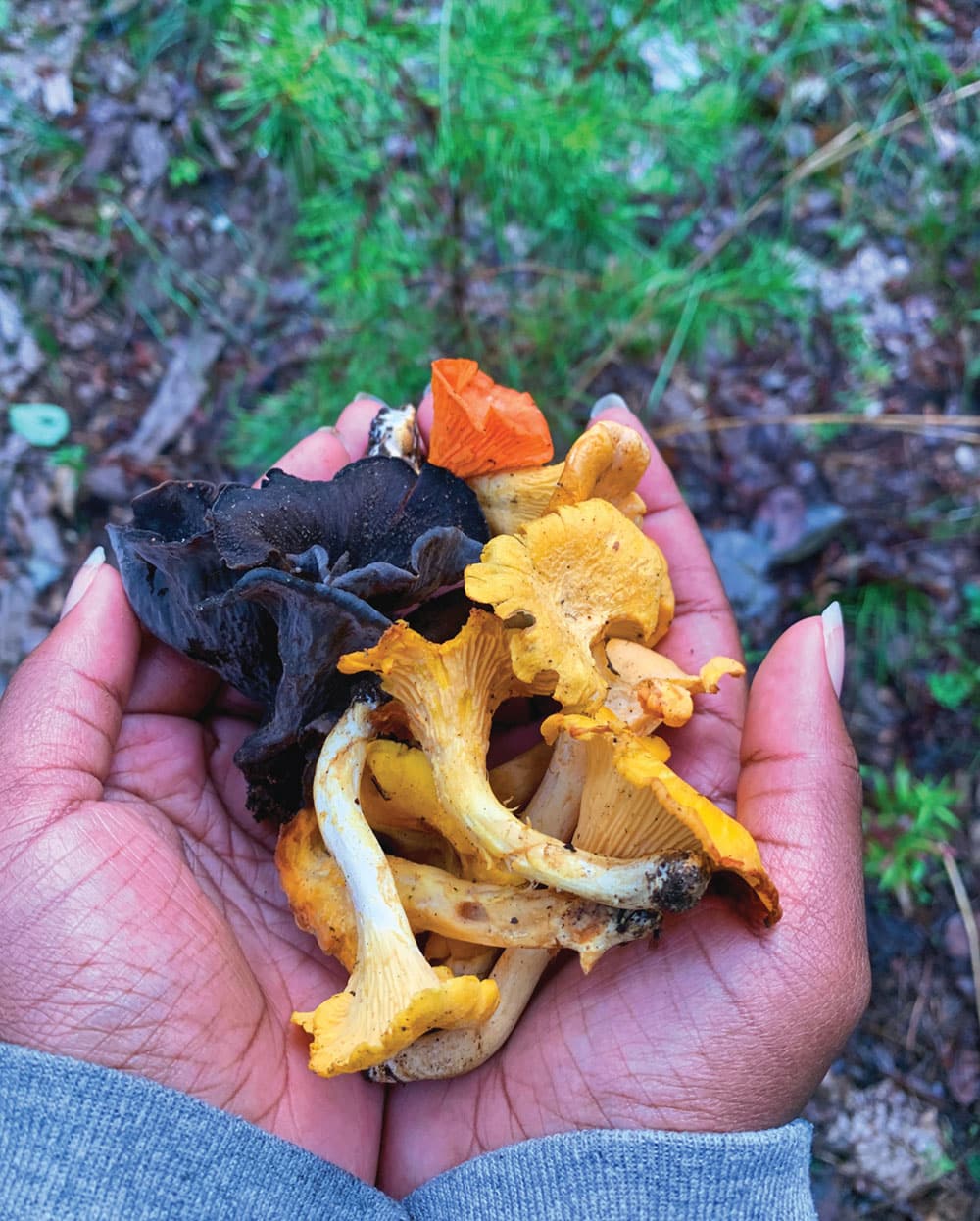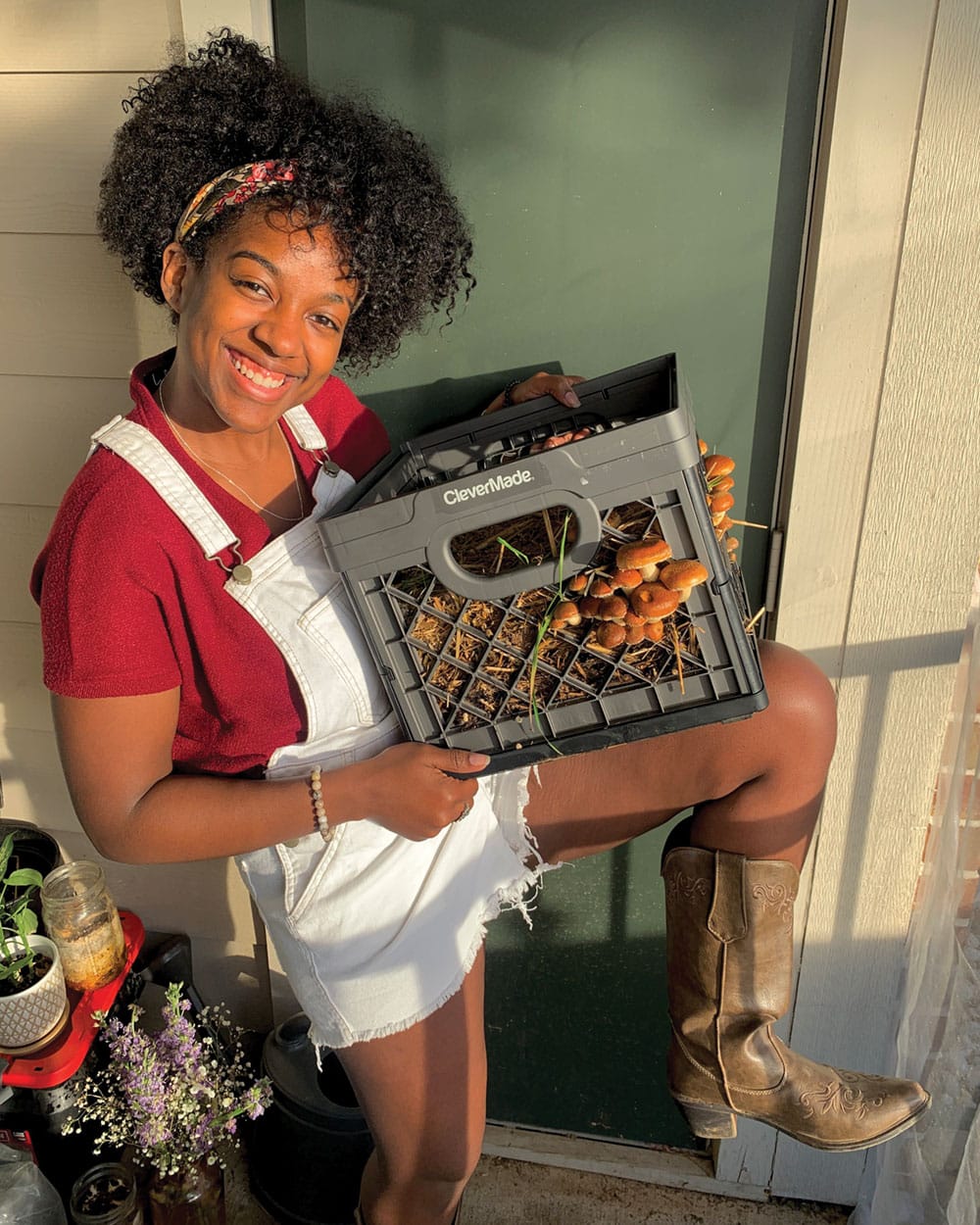From a young age, Carrington Kernodle was interested in identifying the elements of the world around her home. Growing up in the countryside of Danville, Va., Kernodle (she/they) spent most of her days outside, camping, picking up earthworms so she could feel the tickle as they made their way across her hand, and reveling in the fresh air. It was Kernodle’s mother who fed her innate curiosity by buying plant, bug, and animal encyclopedias. “Anything I was ever interested in identifying, I could see it and then go look into every aspect of it,” Kernodle said. “I am who I am because of her.”
These early experiences form the foundation of their business, Parts Homegrown with Carrington. Encompassing everything from sustainability practices and vegan recipes to houseplant house calls and mindfulness classes, they aim to provide a wealth of resources for people to live sustainably within their means. In order to do that, Kernodle says, people must first try to understand their own place in the world. “You can’t advocate for people to care about climate change, animals, or people’s well-being if they don’t develop some kind of sense of connection to that,” they said. “I try to give people as many examples of how to build that connection.”
Kernodle builds these relationships through her understanding of the ecology where she lives in Virginia. On walks she keeps an eye out for things like oak trees. Understanding the symbiotic relationship between trees and fungi, she knows other items of interest, like chanterelles, may be growing nearby. “So when it rains in the next couple of days, we’re going to go outside and check to see what mushrooms are growing because we’re going to eat pasta this weekend,” Kernodle said. “That type of understanding of the land that you live on is invaluable.”

Whether it’s mushrooms or wild berries, being able to identify a species and know what’s not toxic for humans is a rewarding experience. “I bring it home and really think about how connected all of that is, and how beautiful it is that I get to eat that,” Kernodle added. “I feel like a true earthling when I’m eating strictly from the earth. I’m going to learn every single flora and fauna that’s found in Virginia if it’s the last thing I do.”
This approach applies to more than foraging for food. “Nothing is more symbiotic or full life cycle than being able to understand the changing of seasons,” Kernodle said. “It’s a full moon? That means the water is going to be really high when we go over by the reservoir so we need to be mindful of that swamp and wear our good boots.”
For Kernodle, understanding the ways in which an environment changes over time creates a fuller experience.
To Each Their Own
Finding ways to create a sustainable life is a different process for all of Kernodle’s clients and followers. “There’s no sense in me trying to force down people’s throats a very strict dogma of how to do any of this,” she said.
Oftentimes, they recommend starting at home. “When you are really allowed to flourish at home—whether that’s a physical space, your environment, or our bodies—if you pour a lot into that, then it’s going to come out much stronger, healthier, and full of love,” they said. “If you can take care of yourself and you’re aware of your impact, you are much more inclined to nurture everything else that exists on this earth.”
In a society where sustainability has been commodified to the point where it is financially unrealistic for many, Kernodle points to families growing up in lower socioeconomic households as evidence that lifestyle choices don’t have to fit current trends to be good for the environment. “People in those groups are more sustainable by default because that was a means for survival,” they said. “Everything is being reused and eaten. The leftovers are in the Country Crock butter container. It isn’t some fancy glass bamboo top container.” Nothing is wasted because everything costs money.
Kernodle’s advice? Start small and work your way up to big changes.
“There‘s just so many little things that will go a really long way,” she said. “Maybe you can’t eat plants all the time but you could eat plants all day until dinner. That’s a pretty solid effort. You can say I’m not going to buy organic cotton sheets but I’m going to make sure the sheets I do buy last me a few years. There’s a lot of ways sustainability can show up.”
It also means doing things that make you happy, like spending more time outside paying attention to the relationships happening all around you. Don’t like being outside due to bugs, heat, or fear? Consider bringing plants into your home and learning how to take care of them. “It teaches you a lot,” Kernodle said. “You can’t force plants to grow, so it helps me understand patience and being okay with watching the slow growth and change that happens.”
At the end of the day, Kernodle reminds us that it’s all a learning process. “It’s fine if it doesn’t work the first time,” they said. “Give yourself grace when it comes to gardening because there are some things that are just beyond our capabilities and you just accept it.”
Cover photo: Kernodle used a milk crate to grow mushrooms at home, one of her favorite things to forage for on hikes. Photo courtesy of Kernodle








